Best Arduino Boards and Microcontrollers (MCUs) for IoT and Wearables
It doesn’t matter whether you’re new or experienced with Microcontrollers (MCUs), surely you must have heard or come across the Arduino. And because of how easy it is to operate one, Arduino is a cult favourite and is widely used to perform a variety of projects!
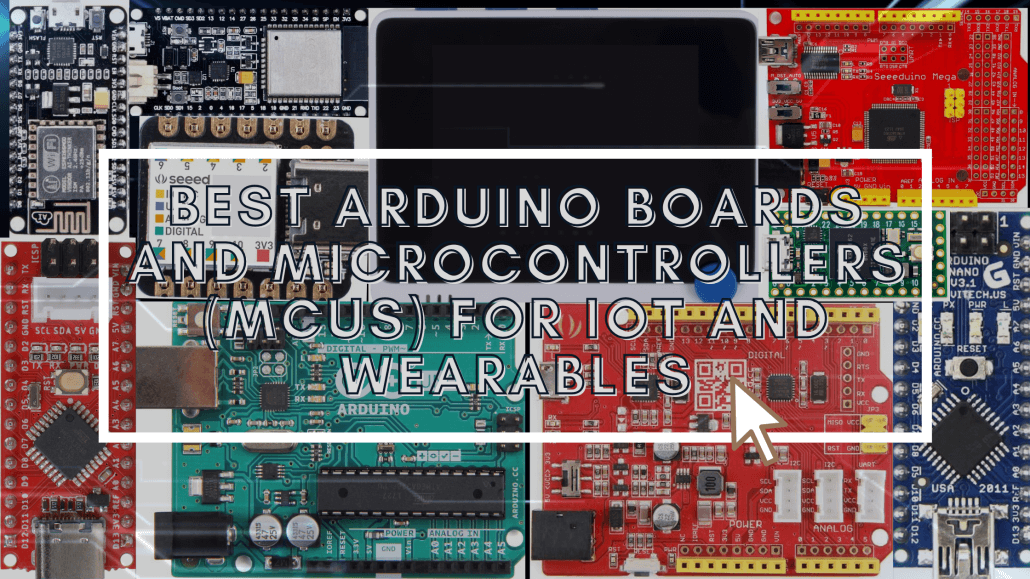
According to the “2020 Microcontroller Market Report“, the global microcontroller market is predicted to attain USD 47.74 billion by 2027, with a focus on automation and Artificial Intelligence (AI) across various verticals such as automotive and industrial. Moreover, more than 30 billion Microcontroller Units (MUCs) were shipped globally in 2019!
Needless to say, the increasing demand for Microcontroller has shown its popularity! Thus, we’ve compiled a list of Arduino boards and Microcontrollers to cater to all your project needs! Don’t fret, we will continue to update this list as we go along, and we hope you’ll be able to find one that satisfies your taste!
Arduino Boards
Best Arduino Starter Kit: Grove Beginner Kit for Arduino ($19.90)

New to Arduino? The Grove Beginner Kit for Arduino got your back! This kit is perfect for STEM teaching and beginners who purely want to learn about Arduino and coding, it brings you the simplest way to get started with Arduino. After you’re more familiar with Arduino, you can also take the modules out and use Grove cables to connect the modules.
Features:
- Arduino UNO compatible board (ATmega320p based Seeeduino Lotus) + 10 most commonly used Arduino modules
- Compatible with over 300 Grove modules
- Beginner-friendly! Step by step project tutorials provided.
- No breadboard and jumper cables required, all modules are pre-wired.
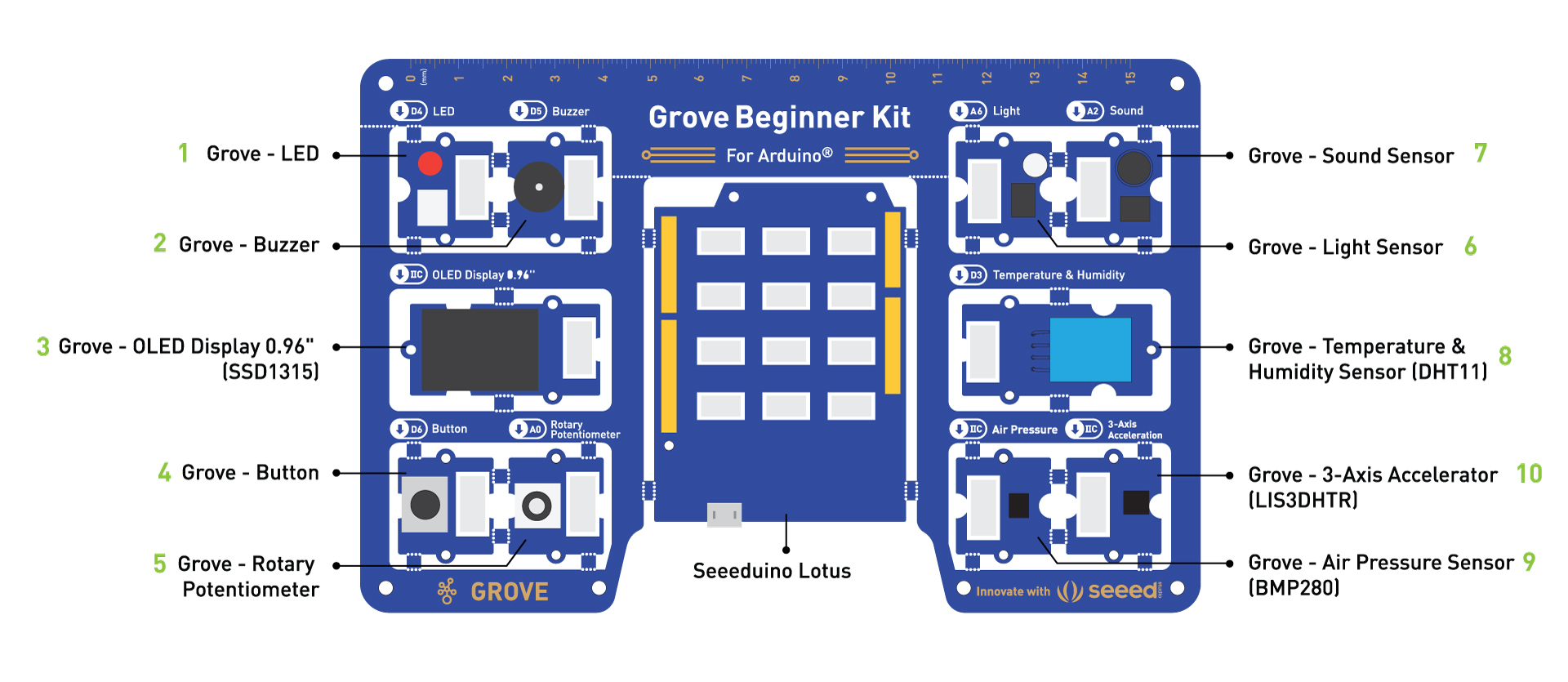
Parts List:
Included in Kit:
- Grove Beginner Kit For Arduino Board x 1
- Micro USB Cable x 1
- Grove Cables x 6
Included onboard:
- Grove – LED x 1
- Grove – Buzzer x 1
- Grove – OLED Display 0.96″ x 1
- Grove – Button x 1
- Grove – Rotary Potentiometer x 1
- Grove – Light x 1
- Grove – Sound x 1
- Grove – Temperature & Humidity Sensor x 1
- Grove – Air Pressure Sensor x 1
- Grove – 3-Axis Accelerator x 1
- Seeeduino Lotus x 1
Best Arduino for beginners: Arduino Uno Rev3 ($24.95)

Arduino Uno Rev3 is an ATmega328 8-bit microcontroller with 32KB of Flash memory and 2KB of RAM. Definitely one of the most popular microcontrollers on the market and it’s beginner-friendly too! But don’t be mistaken, even though its beginner-friendly, it doesn’t mean that it’s not as capable as other microcontrollers.
Features:
- Beginner-friendly!
- ATmega328 8 bit microcontroller
- 14 Digital I/O Pins (6 PWM outputs)
- 32k Flash Memory
- 32KB of Flash memory
- 6 Analog Inputs
- 16Mhz Clock Speed
Processing capability:
| Board | Microcontroller | Flash Memory | SRAM | Pins and Interface |
| Arduino Uno Rev3 | ATmega328 | 32KB | 2KB | – 14 Digital I/O Pins (6 PWM outputs) – 6 Analog Inputs – 16Mhz Clock Speed |
Best Arduino for Portable projects: Arduino Nano v3 ($45.90)

Want a tiny board that would fit into your tiny portable projects? Arduino Nano v3 would definitely help you out on that! It is a small, yet complete and breadboard-friendly ATmega328 microcontroller. Though it’s missing a DC jack, it works with a mini-USB cable.
Features:
- Tiny and breadboard-friendly!
- ATmega328 microcontroller
- 14 Digital I/O Pins (6 PWM Digital I/O Pins)
- 32 kB Flash Memory
- 8 analog inputs
- 16 MHz Clock Speed
Processing Capability:
| Board | Microcontroller | Flash Memory | SRAM | Pins and Interface |
| Arduino Nano v3 | ATmega328 | 32KB | 2KB | – 14 Digital I/O Pins (6 PWM Digital I/O Pins) – 8 Analog Input Pins – 16 Mhz Clock Speed |
Seeed’s Arduino IDE-compatible boards
Here at Seeed, we also manufacture our very own Arduino IDE-compatible boards! If you’re interested in checking out cost-effective yet high-quality boards, you definitely wouldn’t want to miss out on these products!
Seeeduino V4.2 ($6.90)

Seeeduino V4.2 is one of our best-selling Seeeduino board and it’s based on ATmega328P MCU, Arduino UNO bootloader, and with an ATMEGA16U2 as a UART-to-USB converter. It is not only versatile and easy to operate, but it is also much more cost-effective than Arduino Uno Rev3!
Features:
- Affordable!
- Similar specs to Arduino Uno: ATmega328P microcontroller, 14 Digital I/O Pins (6 PWM outputs), 6 Analog Inputs.
- Arduino UNO-R3 Shield Compatible
- 3 on-board Grove connectors
Processing Capability:
| Board | Microcontroller | Flash Memory | SRAM | Pins and Interface |
| Seeeduino V4.2 | ATmega328 | 32KB | 2KB | – 14 Digital I/O Pins (6 PWM outputs) – 6 Analog Inputs – ISP Header – 16 Mhz Clock Speed |
Seeeduino Nano ($6.90)

Looking for a more affordable Arduino Nano option? Seeeduino Nano is definitely one of the better alternatives on the market! With the same specs as an Arduino Nano, but with two additions: The Seeeduino Nano uses Type-C instead of mini-USB, and it also has one Grove I2C connector which makes it a better option than an Arduino Nano.
Features:
- Tiny and compact!
- Similar specs to Arduino Nano: ATmega328 microcontroller, 14 Digital I/O Pins (6 PWM Digital I/O Pins), 8 analog inputs
- Fully compatible with Arduino Nano
- 1 I2C Connector
- Type-C USB
Processing Capability:
| Board | Microcontroller | Flash Memory | SRAM | Pins and Interface |
| Seeeduino Nano | ATmega328 | 32KB | 2KB | 14 Digital I/O Pins (6 PWM outputs) |
Seeeduino Mega ($43.00)

Seeeduino Mega is an affordable alternative for Arduino Mega, which is meant to support all your advanced projects needs! However, what makes Seeeduino Mega so great is its form factor: 30% smaller than an Arduino Mega! Moreover, it has 70 Digital I/O pins, which exceeds Arduino Mega’s 54 Digital IO.
Features:
- Small form factor: 30% smaller than Arduino Mega
- Compatible with most Arduino Duemilanove and Diecimila Shields
- Easy to program, no additional hardware is required to load firmware
- Similar specs to Arduino Mega: ATmega 2560, 16 Analog inputs, 4 Hardware serial ports (UART)
- 70 Digital I/O pins (14 PWM outputs)
Processing Capability:
| Board | Microcontroller | Flash Memory | SRAM | Pins and Interface |
| Seeeduino Mega | ATmega 2560 | 256 KB | 8KB | – 70 Digital I/O Pins (14 PWM outputs) – 16 Analog inputs – ICSP Header – 4 Hardware serial ports (UART) |
Seeeduino XIAO ($4.90)

Seeking for a small yet powerful microcontroller? Look no further than Seeeduino XIAO! Despite its tiny exterior, it carries the powerful CPU-ARM® Cortex®-M0 + SAMD21G18, a low-power Arduino microcontroller. Which makes it perfect for Arduino wearables as well as small projects!
Features:
- Tiny and breadboard-friendly
- ARM® Cortex®-M0 + 32bit 48MHz SAMD21G18
- Compatible with Arduino IDE
- Development interfaces: 11 digital/analog pins, 10 PWM Pins, 1 DAC output, 1 SWD Bonding pad interface, 1 I2C interface, 1 UART interface, 1 SPI interface.
Processing Capability:
| Board | Microcontroller | Flash Memory | SRAM | Pins and Interface |
| Seeeduino XIAO | ARM® Cortex®-M0 + 32bit 48MHz SAMD21G18 | 256 KB | 32KB | -11Digital I/O Pins – 14 GPIO Pins – 11 analog Pins – 1 DAC output Pin |
Seeeduino XIAO Family
Seeed XIAO ESP32C3
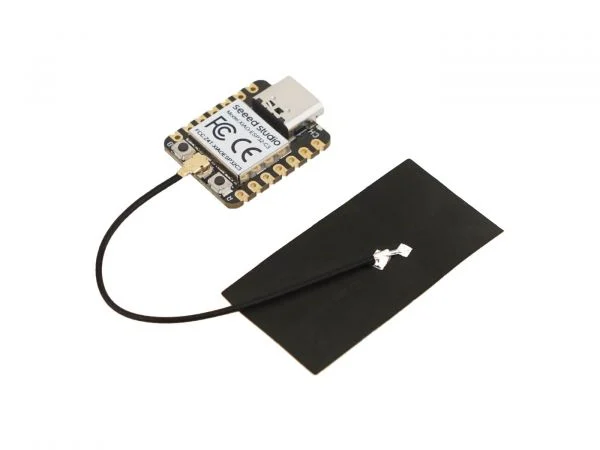
Seeed Studio XIAO ESP32C3 is the latest XIAO series, which has equipped with a highly-integrated ESP32-C3 chip, built around a 32-bit RISC-V chip processor with a four-stage pipeline that operates at up to 160 MHz.
The board equips highly-integrated ESP32-C3 SoC. The chip has been installed with a complete 2.4GHz Wi-Fi subsystem which means it supports Station mode, SoftAP mode, SoftAP & Station mode, and promiscuous mode for multiple Wi-Fi applications. It works under an ultra-low power state, also supporting features of Bluetooth 5 and Bluetooth mesh. There are 400 KB SRAM & 4 MB Flash on the chip, allowing for more programming space, and bringing more possibilities to the IoT control scenarios.
Seeed XIAO RP2040
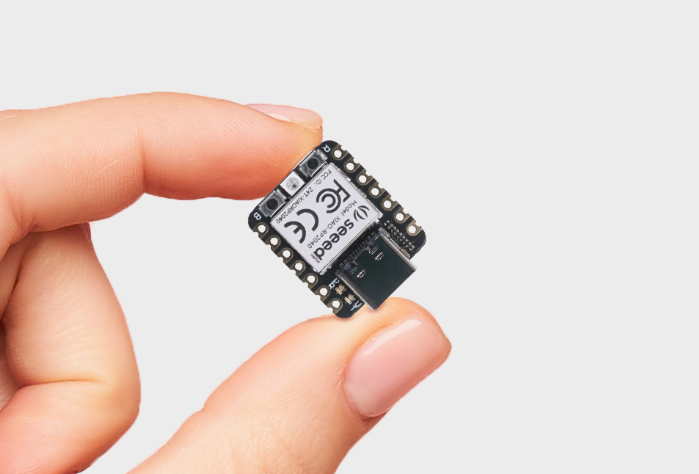
XIAO RP2040 is a microcontroller using the Raspberry Pi RP2040 chip. The MCU runs at up to 133MHz. It is built with rich interfaces in a tiny thumb size and fully supports Arduino, MicroPython, and CircuitPython.
The onboard interfaces are enough for developing multiple applications. And it has no components on the back, is breadboard-friendly, and SMD design, making it easy to use for projects.
Seeed XIAO BLE & BLE Sense
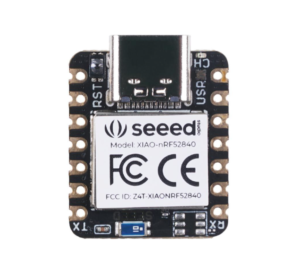
As the first wireless product in the Seeed XIAO family, Seeed XIAO BLE & BLE Sense has equipped a powerful Nordic nRF52840 MCU which is designed in a Bluetooth 5.0 module, built around a 32-bit ARM® Cortex™-M4 CPU with Floating-Point Unit(FPU) operating at 64Mhz.
With the capability of wireless connection, they still remain the Seeed XIAO series classic form-factor of small and exquisite which can be used for wearable devices and Internet of Things projects.
Other Arduino IDE-compatible boards
Apart from Seeed and Arduino’s MCUs, there are also other amazing Arduino compatible MCUs out there on the market! Let’s look at other popular MCUs loved by many of you Tech enthusiasts!
Wio Terminal ($29.90)

There is so much you can do with the new and versatile Wio Terminal! It is an ATSAMD51-based microcontroller with wireless connectivity supported by Realtek RTL8720DN. Also, it is a complete system equipped with Screen + Development Board + Input/Output Interface + Enclosure, making it an efficient and Product-Ready Product!
Features:
- Microchip ATSAMD51P19 with ARM Cortex-M4F core running at 120MHz (A Powerful MCU!)
- Raspberry Pi 40-pin Compatible GPIO
- Compatible with over 300 plug & play Grove modules to explore with IoT
- Reliable Wireless Connectivity: Dual Band 2.4Ghz / 5Ghz Wi-Fi (802.11 a/b/g/n), BLE / BLE 5.0
- Support Arduino, CircuitPython, Micropython, ArduPy, AT Firmware, Visual Studio Code
- 2.4” LCD Screen, IMU and more practical add-ons housed in a compact enclosure with built-in magnets & mounting holes (Highly Integrated Design)
Processing Capability:
| Board | Microcontroller | Flash Memory | SRAM | Pins and Interface |
| Wio Terminal | ATSAMD51P19 with ARM Cortex-M4F core | 4 KB | 192KB | – 40 Pin GPIO – MicroSD slot max. 16GB – 2 multifunction Grove |
NodeMCU v2 ($8.20)

The NodeMCU v2 will be perfect for you if you’re looking for an easy, simple to use MCU for Internet of Things (IoT)! It is based on ESP8266, a low-cost WiFi module on-board and integrates GPIO, PWM, IIC, 1-Wire and ADC all in one board. On top of that, it’s really affordable as well!
Features:
- Affordable, user-friendly!
- WiFi-enabled
- Open source, programmable
- Nodejs style network API
- Headers – 2.54mm 15-pin header with access to GPIOs, SPI, UART, ADC, and power pins
- Arduino-like hardware IO
Processing Capability:
| Board | Microcontroller | Flash Memory | SRAM | Pins and Interface |
| NodeMCU v2 | 32-bit RISC Tensilica Xtensa LX106 | 4 KB | 64KB | – 16 Digital I/O Pins – 1 Analog Input Pin – 80 MHz Clock Speed |
TI MSP430 USB LaunchPad ($12.99)

The Texas Instrument’s MSP430 is a low-power MCU that is amazing for beginners! Moreover, this particular one comes with USB! It has an onboard emulation for programming and debugging, as well as buttons and LEDs for simple user interface. Though Arduino IDE isn’t exactly compatible, users can use Energia to run Arduino libraries!
Features:
- Beginner-friendly, perfect for IoT!
- MSP430F5529 16-bit MCU
- Various USB device class examples and embedded software libraries available (CDC, HID, MSC)
- One USB connection for emulator and target via the use of an onboard USB hub
- timers, serial communication (UART, I2C, SPI)
Processing Capability:
| Board | Microcontroller | Flash Memory | SRAM | Pins and Interface |
| TI MSP430 USB LaunchPad | MSP430F5529 16-bit MCU | 128 KB | 8KB | 40-pin BoosterPack expansion headers, 12-bit analog-to-digital converter (ADC), timers, serial communication (UART, I2C, SPI) |
Particle Photon ($19.00)

Looking for a petite MCU to use in your IoT projects? Particle Photon would be the perfect fit for your projects! It is not only easy to use, but it also combined a powerful ARM Cortex M3 microcontroller with a Broadcom Wi-Fi chip in a tiny thumbnail-size module called the P0 (P-Zero). Which makes it powerful and would satisfy all your tiny projects needs!
Features:
- Tiny, portable and beginner-friendly!
- Broadcom BCM43362 Wi-Fi chip
- STM32F205 120Mhz ARM Cortex M3
- Open-source design
- 18 Mixed-signal GPIO and advanced peripherals
- Real-time operating system (FreeRTOS)
Processing Capability:
| Board | Microcontroller | Flash Memory | SRAM | Pins and Interface |
| Particle Photon | STM32F205 120Mhz ARM Cortex M3 | 1 MB | 128KB | – 18 Mixed-signal GPIO and advanced peripherals |
GeeekNET ESP32 Development Board ($19.95)

The ESP32 is based on the WROOM32 module, perfect for IoT projects, it is also the successor of the ESP8266 processor. The ESP32 would provide a larger number of GPIOs, including analogue inputs and outputs, and a more powerful and faster processor.
Features:
- Dependable and a great option for IoT projects
- Dual-core ESP32 chip
- USB-serial converter
- WiFi, Bluetooth and Bluetooth BLE connectivity for working on connected and/or wireless projects
- A lithium-ion/polymer charger
Processing Capability:
| Board | Microcontroller | Flash Memory | SRAM | Pins and Interface |
| GeeekNET ESP32 Development Board | Xtensa® Single-/Dual-core 32-bit LX6 microprocessor(s) | 4 x 16KB | 520KB | – 12-bit SAR ADC up to 18 channels – 8-bit D/A converters – Ethernet MAC interface with dedicated DMA and IEEE 1588 support |
Most powerful MCU: Teensy 4.0 ($19.95)

Teensy 4.0 is an upgraded version of its previous models, and just as its name suggests, it is a tiny MCU. It features the powerful ARM Cortex-M7 processor at 600 MHz, with an NXP iMXRT1062 chip. With its software add-on, Teensyduino, it allows users to run Arduino programs. Fun fact: It is actually the fastest MCU available today!
Features:
- Tiny and speedy!
- NXP iMXRT1062 chip: Provides the functionality of a microcontroller, but at the speed of a microcomputer
- ARM Cortex-M7 at 600MHz
- 2 USB ports, both 480MBit/sec
- Power On/Off management
- Programmable using Teensyduino
Processing Capability:
| Board | Microcontroller | Flash Memory | SRAM | Pins and Interface |
| Teensy 4.0 | ARM Cortex-M7 processor at 600 MHz+ NXP iMXRT1062 chip | 2048KB | 1024KB | 40 digital pins (31 PWM pins), 14 analog pins, 2 ADCs on chip |
Processing capability comparison
| Board | Microcontroller | Flash Memory | SRAM | Pins and Interface | Price |
| Arduino UNO Rev 3 | ATmega328 | 32KB | 2KB | – 14 Digital I/O Pins (6 PWM outputs) – 6 Analog Inputs – 16Mhz Clock Speed | $24.95 |
| Arduino Nano v3 | ATmega328 | 32KB | 2KB | – 14 Digital I/O Pins (6 PWM Digital I/O Pins) – 8 Analog Input Pins – 16 Mhz Clock Speed | $45.90 |
| Seeeduino V4.2 | ATmega328 | 32KB | 2KB | – 14 Digital I/O Pins (6 PWM outputs) – 6 Analog Inputs – ISP Header – 16 Mhz Clock Speed | $6.90 |
| Seeeduino Mega | ATmega 2560 | 256 KB | 8KB | – 70 Digital I/O Pins (14 PWM outputs) – 16 Analog inputs – ICSP Header – 4 Hardware serial ports (UART) | $43.00 |
| Seeeduino XIAO | ARM® Cortex®-M0+ 32bit 48MHz SAMD21G18 | 256KB | 32B | – 11Digital I/O Pins – 14 GPIO Pins – 11 analog Pins – 1 DAC output Pin | $4.90 |
| Wio Terminal | ATSAMD51P19 with ARM Cortex-M4F core | 4KB | 192KB | – 40 Pin GPIO – MicroSD slot max. 16GB – 2 multifunction Grove | $29.90 |
| NodeMCU v2 | 32-bit RISC Tensilica Xtensa LX106 | 4KB | 64KB | – 16 Digital I/O Pins – 1 Analog Input Pin – 80 MHz Clock Speed | $8.20 |
| TI MSP430 USB LaunchPad | MSP430F5529 16-bit MCU | 128KB | 8KB | – 40-pin BoosterPack expansion headers – 12-bit analog-to-digital converter (ADC), timers, serial communication | $12.99 |
| Particle Photon | STM32F205 120Mhz ARM Cortex M3 | 1MB | 128KB | – 18 Mixed-signal GPIO and advanced peripherals | $19.00 |
| GeeekNET ESP32 Development Board | Xtensa® Single-/Dual-core 32-bit LX6 microprocessor(s) | 4 x 16 KB | 520KB | – 12-bit SAR ADC up to 18 channels – 8-bit D/A converters – Ethernet MAC interface with dedicated DMA and IEEE 1588 support | $19.95 |
| Teensy 4.0 | ARM Cortex-M7 processor at 600 MHz + NXP iMXRT1062 chip | 2048KB | 1024KB | – 40 digital pins (31 PWM pins) – 14 analog pins – 2 ADCs on chip | $19.95 |
Summary
And that’s all on the Best Arduino boards and MCUs for beginners and veterans! Have you tried any of them before? As we mentioned in the beginning, we will continue to update this list. So do let us know what are some of your favourites!